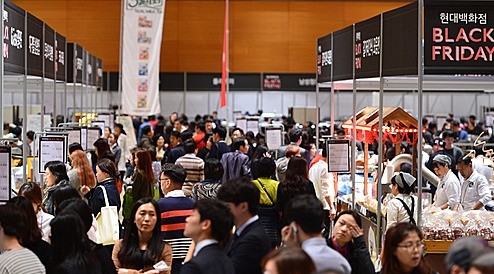
[Special Economy=Eunji Kim]With the Korean government's plan to uplift consumer confidence no longer being implemented, the CCSI (Composite Consumer Sentiment Index) has taken a turn downwards—in six months.
Consequently, the fear of dismal consumers in Korea is rising; last Thursday, the Bank of Korea reported its December consumer trend survey result, and CCSI declined three points from last month, recording at 103 points.
If the CCSI has points higher than 100, that means the consumers' subjective expectation for the economy is positive, thus encouraging buying. If it's lower than 100, it is the other way around.
Although the recent CCSI is at 103 points, there is still less enthusiasm in consumers, and this is just the start in the possible downward trend forecasted by analysts.
The low consumer confidence shown after last May's MERS outbreak has improved over the months but again, that can change, as the U.S. raised interest rate's bearish factors come into play.
Last June, CCSI slumped to 99 points—the lowest level since September 2012. With this in mind, the government pursued various economic stimulation policies, such as encouraging grand sales at department stores.
For example, from last August to October, department stores partook in "Korea Grand Sale", from then on, "Korea Black Friday," and "K-Sale Day" occurred.
The result was effective: CCSI in July rose to 100 points, 102 points in August, 103 points in September, 105 points in October, 106 points in November, steadily increasing for five consecutive months.
But, the problem is these stimulation policies did not provide a "fundamental solution" to combat the low consumer confidence. Also, because the Federal Reserve Board recently decided to raise its interest rate, the Bank of Korea received a dilemma of whether to do the same, further tightening consumers' wallets.
Looking at this survey, next year's economic growth outlook is not optimistic; the government previously signaled for consumer confidence recovery but question remains if that can be achieved.
However, the government and the Bank of Korea say consumer confidence is "shrinking," as to them, it has not yet "plummeted," still having hope that there could be more upbeat consumers on the way.
| 개선되고 있었던 소비심리 뒷걸음질? 6개월 만에 다시 위축 [스페셜경제=김은지 인턴기자]정부가 추진했던 단발성 소비 진작책이 사라진 후 개선되고 있었던 소비심리가 6개월 만에 다시 위축했다. 지난 메르스 사태로 뒷걸음질 쳤던 소비심리가 이제 세일 조치와 미국 기준금리 인상 악재까지 더해지면서 ‘소비절벽’ 우려가 내년 초부터 다시 제기될 것이라는 전망이다. 24일 한국은행이 발표한 ‘12월 소비자동향조사 결과’에 따르면 이달 중 소비자심리지수(CCSI)는 전월보다 3포인트 떨어져 103으로 기록했다. 지난 6월 메르스 여파 때문에 CCSI는 2012년 9월 이후 최저치를 기록해 무려 99까지 떨어졌었다. 이로 인해 정부는 소비심리를 회복하기 위해 다양한 부양책을 추진했다. 특히 세일 이벤트를 실행해 지난 8월부터 ‘코리아그랜드세일’과 ‘코리아 블랙프라이데이’, ‘K-세일데이’등이 진행됐었다. 효과는 물론 CCSI는 7월 100으로 소폭 올랐고 이후 계속 상승했다. 8월에는 102, 9월 103, 10월 105, 11월 106으로 5개월 연속 올랐다. 문제는 이 같은 부양책이 근본적인 해결책이 되지 못한 것이다. 이번 달 별 다른 세일 행사가 없어지자 소비심리가 얼어붙으며 CCSI가 6개월 만에 하락 전환했다. 게다가 미국이 금리인상을 결정했기 때문에 한국은행도 따라서 금리인상 우려가 제기되면서 돈 씀씀이가 줄기 시작됐다. 이번 소비자동향조사는 전국 도시의 2046가구를 조사했다. 이들의 생활형편, 소비지출, 향후경기, 취업기회, 주택가격전망 등은 전월보다 최소 2포인트에서 최대 11포인트까지 떨어진 것으로 나타났다. 반면 금리수준(+4), 가계부채(+1), 물가수준전망(+2·이상 전월 대비)은 1~4포인트 오르며 소비자들의 삶은 갈수록 팍팍해지고 있는 것으로 나타났다. 이번 조사 결과만 놓고 보면 내년 경제 성장 전망은 딱히 긍정적이지가 않다. 정부는 내년 경제 성장의 핵심 동력을 ‘내수 회복’으로 꼽았는데 소비심리가 뒷걸음질 하는 바람에 이에 대한 힘이 빠져버렸다.
|

